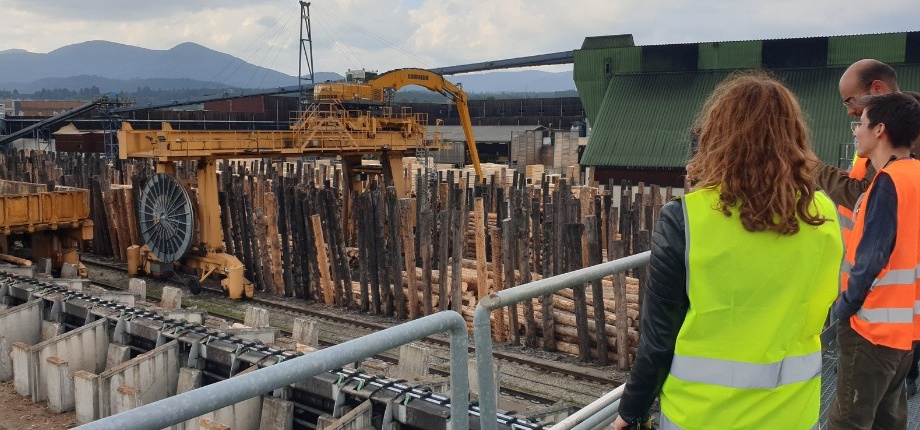Civil Engineering and Construction
There is more building going on in the world today than ever before (whole cities in certain emerging countries, offshore construction, transit networks…). Urban density demands the invention of entirely new solutions, for both buildings and infrastructures (very tall skyscrapers, urban infrastructure networks…).
Needs are evolving, engendering constructions that are unprecedented in both function and size (mega-stadia, giant airports, high-speed rail networks, etc.).
The environmental impact of construction is such that a profound technical transformation is needed (reduction in energy costs, recycling facilities…). Phenomena like soil erosion, pollution, and subsidence are increasingly common; overcoming them requires significant development in soil mechanics and the associated techniques. New materials (very high-resistance concrete and steel, composites) and new, IT-related calculation methods are emerging, transforming structural design.
The relationship between society and technology has changed. Close attention to the context, to the environment, and to users is now demanded, which means that engineers have to be able to explain, negotiate and to debate in order to implement the most appropriate technical solutions. These crucial changes call for design and structural engineers of the highest caliber, capable of handling complexity in a multidisciplinary approach.
The engineering programme at École nationale des ponts et chaussées prepares each student to become a real player in sustainable development and planning in all its dimensions. Engineers graduating from École nationale des ponts et chaussées are recognized by companies for their strong scientific skills combined with a capacity for practical implementation of knowledge and projects.
Engineering education at École nationale des ponts et chaussées leads to the development of skills in four dimensions:
Advanced scientific and technical education: understanding and implementing conceptual, mathematical or numerical modelling approaches while knowing how to critically evaluate the results of a model is one of the foundations of the engineering profession that the School's training enables students to master.
Project-based and on-the-job training: from the very first year, numerous collective or individual projects are developed, increasingly close to real engineering projects. For students entering the first year, four internships in laboratories and companies will punctuate the curriculum.
Managerial, human and social skills: integrated from the first year, the human and social sciences give students an understanding of the world and the ability to take into account the problems of society. A solid knowledge of the business world is developed through courses, internships and projects.
The ability to work in a team and to work internationally: 20% of teaching time is devoted to languages. International stays and contact with many foreign students enable engineering students to learn to work in a multicultural context.
In the context of admissions of international students from partner institutions, it should be specified that:
The engineering degree from Ecole nationale des ponts et chaussées is a general engineering degree with prerequisites common to all teaching departments in the School's core disciplines: Mathematics (Optimization, Probability, Analysis and Scientific Computing), Continuous and Solid Mechanics, Quantum Physics and Statistics, Programming, Human and Social Sciences.
The vast majority of courses in engineering training are in French. A B1 level in French is therefore required to be proven by a certificate (TEF, TCF, DELF, or DALF).
A TOEIC score of at least 785 points (or an equivalent international test, such as TOEFL, IELTS or Cambridge Proficiency, CAE or FCE) is required in order to obtain an engineering degree from Ecole nationale des ponts et chaussées at the end of the course. For this reason, a B1 level in English is required for admission, to be proven by a certificate (IELTS, TOEFL, TOEIC, CAMBRIDGE).
In addition, each department of engineering education has specific prerequisites:
Civil and Structural Engineering Department
Scientific analysis and calculation
Fundamental numerical methods for the engineer: finite differences for time integration of evolutionary equations, finite elements for solving variational problems.
Linear algebra, matrix calculus, tensor calculus.
Laplace transform, Fourier transform.
Partial differential equations and finite elements
Solid Mechanics
Kinematics and dynamics of non-deformable solids
Geometric Transformation: Eulerian and Lagrangian Descriptions
Internal stresses for 3D continuous medium: Cauchy stress tensor, Green-Lagrange strain tensor, linearization
Thermodynamic approach to linear thermoelastic behavior, three-dimensional linear thermo elasticity problems
Flat deformations
Theorem of kinetic energy
The Theorems of Minimum Potential Energy and Complementary Energy
Principle of the finite element method in linear elasticity
Linear elasticity finite element method
Concepts of Limit Analysis and the Study of Linear Elastic Curvilinear Media
Fluid mechanics
Eulerian Kinematics
Euler's equations
Navier-Stokes equations
Reynolds Number Irrotational plane flows of perfect incompressible fluid
Actual and complex potential
Conformal transformations
Transformation and Zhukovsky profiles
Probabilities
Fundamental notions (probability space, random variable, law, expectation ...)
Usual laws with real and integer values.
Concepts of convergence
Strong Law of Large Numbers
Central Limit Theorem
Main algorithms for simulating random variables
Monte-Carlo method
Curriculum:
- Theoretical foundations of mechanics and dynamics, applied to structures, soils, and fluids;
- A choice of further work on geotechnics, marine structures, the structures or energy properties of buildings, combining theoretical courses and experiment;
- Two long projects (building, bridge, port, road, or dam) involving technical experiment and the learning of design methods;
- Instruction on a wide range of more specific topics, covering all aspects of civil engineering and construction, as chosen by the student;
- Seminars.
| Semester | Year Master cycle | Course title | ECTS | Status | Track | Instruction language |
| Fall | 1 | Business Management | 2 | Compulsory | French | |
| Fall | 1 | Calculation and behaviour of materials | 3 | Compulsory | French | |
| Fall | 1 | Drawing and computer graphics | 3 | Compulsory | French | |
| Fall | 1 | Engineering Geology Week | 1 | Compulsory | French | |
| Fall | 1 | Fluid Mechanics | 3 | Compulsory | French | |
| Fall | 1 | Introduction to building materials | 1 | Compulsory | French | |
| Fall | 1 | Introduction to drawing and computer graphics | 1 | Compulsory | French | |
| Fall | 1 | Practice of statistical methods (Statistics) | 2 | Compulsory | French | |
| Fall | 1 | Soil and Rock Mechanics | 3 | Compulsory | French | |
| Fall | 1 | Structural mechanics | 4,5 | Compulsory | French | |
| Fall | 1 | Techniques and architecture of Civil Engineering works | 3 | Compulsory | French | |
| Fall | 1 | Acoustics | 3 | Elective | French | |
| Spring | 1 | Accessibility Day | 0 | Compulsory | French | |
| Spring | 1 | Dynamics of Structures and Constructions | 3 | Compulsory | French | |
| Spring | 1 | Introduction to law | 3 | Compulsory | French | |
| Spring | 1 | Plasticity and calculation at breakage | 3 | Compulsory | French | |
| Spring | 1 | Thermics | 1,5 | Compulsory | French | |
| Spring | 1 | Shells and advanced structures | 2,5 | Elective | French | |
| Spring | 1 | Statistics - Practice of learning methods | 2 | Elective | French | |
| Spring | 1 | Design of geotechnical structures | 6 | Semi-elective | French | |
| Spring | 1 | Design of structures | 6 | Semi-elective | French | |
| 1 | Coaching and Career Guidance | 0,5 | Compulsory | French | ||
| 1 | Humanities and Social Sciences | 3 | Compulsory | French | ||
| 1 | Internship | 2,5 | Compulsory | |||
| 1 | Languages | 7,5 | Compulsory | |||
| 1 | Sport | 1 | Compulsory | French | ||
| Fall | 2 | Civil Engineering Project Management and Economics | 3 | Compulsory | French | |
| Fall | 2 | Construction site of the Future: Methods/BIM | 1 | Compulsory | French | |
| Fall | 2 | Internship feedback | 1,5 | Compulsory | French | |
| Fall | 2 | Languages | 4,5 | Compulsory | ||
| Fall | 2 | Bridge design and construction | 3 | Elective | French | |
| Fall | 2 | Design of underground structures | 3 | Elective | French | |
| Fall | 2 | Structures, energy and risks | 3 | Elective | French | |
| Fall | 2 | Advanced Concrete | 3 | Semi-elective | French | |
| Fall | 2 | Advanced Construction Dynamics | 3 | Semi-elective | French | |
| Fall | 2 | Advanced structural design | 3 | Semi-elective | French | |
| Fall | 2 | Bioclimatic building project | 7,5 | Semi-elective | Bioclimatic building | French |
| Fall | 2 | Bridge project | 7,5 | Semi-elective | French | |
| Fall | 2 | Building the curve | 1 | Semi-elective | French | |
| Fall | 2 | Concrete, innovative materials | 1 | Semi-elective | French | |
| Fall | 2 | Dam project | 7,5 | Semi-elective | French | |
| Fall | 2 | Design of an arch | 1 | Semi-elective | French | |
| Fall | 2 | Energy efficiency of buildings | 3 | Semi-elective | Bioclimatic building | French |
| Fall | 2 | Finite Elements for Civil Engineering | 3 | Semi-elective | French | |
| Fall | 2 | Geomechanics and Advanced Geotechnics | 3 | Semi-elective | French | |
| Fall | 2 | Life Cycle Assessment | 1,5 | Semi-elective | Bioclimatic building | French |
| Fall | 2 | Masonry wall: design, construction and breakage | 1 | Semi-elective | French | |
| Fall | 2 | Reinforced and prestressed concrete | 3 | Semi-elective | French | |
| Fall | 2 | Road project | 7,5 | Semi-elective | French | |
| Fall | 2 | Steel construction | 3 | Semi-elective | French | |
| Fall | 2 | Wooden structures | 3 | Semi-elective | French | |
| Spring | 2 | Graduation project | 30 | Compulsory |
- Advanced Dynamics of Constructions
- Advanced Structures Design
- Design of Geotechnical Works
- Applied Design of Geotechnical Works
- Bioclimatic building design project
- Bridges Project
- Building materials and engineering design
- Buildings energy and comfort performance
- Concrete durability
- Concrete rheological properties and workability
- Dam Project
- Coastal and harbor Project
- Design of geotechnical structures
- Dynamics of Construction
- Dynamics of Structures
- Finite element method for civil engineering structures
- Fluid Mechanics for Incompressible Flows
- Future Construction Technologies : Techniques and Building Information Modeling (BIM)
- Geomechanics and advanced geotechnics
- Highway Project
- Introduction to drawings and computers graphics (Rhino, Photoshop)
- Life cycle analysis
- Plasticity, limit analysis and Yield design
- Soil and rock mechanics
- Structural Design - Application
- Structural design - theoretical part
- Structures, energy and risks
- Wood structures
► Course catalogue: follow the link
Up to 30% of programme courses can be chosen among other departments (City, Environment, Transportation; Mechanical Engineering and Materials Science; Industrial engineering; Applied mathematics and computer science; Economics, management, finance; Languages and Cultures; Humanities and Social Sciences).
A qualification from the Civil and Structural Engineering Department opens up employment opportunities in all sectors of construction (building, public works, engineering works, geotechnical engineering, structures, maritime engineering, energy infrastructures…) and access to numerous careers: urban development, project management, project design, building contractor, research and development, methods.

